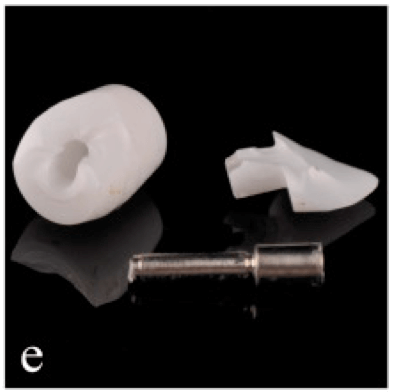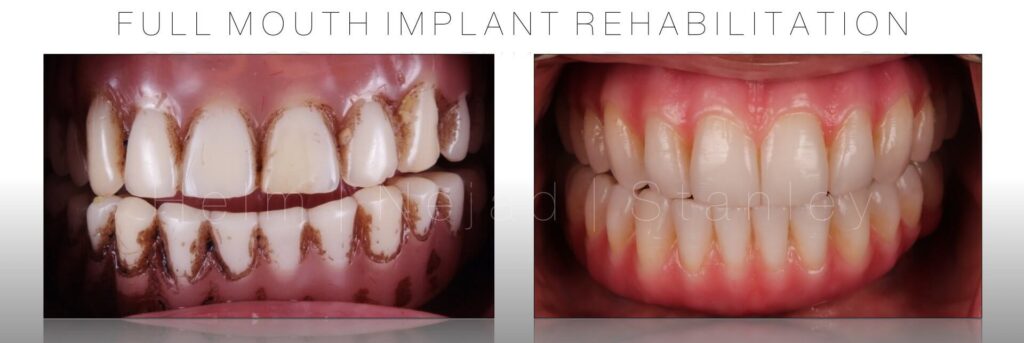Titanium Rods and Screws in Back Can You Have a Root Canal
Category: Biomimetic, Implant & Surgery
Zirconia Dental Implants Vs. Titanium Implants
Patients are becoming increasingly concerned with the materials coming into contact with their bodies and the impact this can have on their overall health and safety. When selecting dental implants, it is ideal to use the least reactive and least toxic material possible. It is also important to evaluate the strength, clinical success, manufacturer quality, and other implant material and design factors.
Over the years, the trend has been towards avoiding the use of metals in our body. An alternative material to titanium exists in the form of zirconia for dental implants. Health-conscious patients frequently ask, "Are zirconia dental implants better than titanium?" The answer to this question is not simple, as it is important to understand the potential benefits, limitations, risks, and current state of zirconia dental implant options.
In this article:
Dental Implant Materials
Zirconia Vs. Titanium Implant Safety
Titanium Allergy
Conclusion
What Are Zirconia Implants
Dental implants are medical devices used to replace missing teeth. Since the 1960s, titanium implants have been the industry standard. With decades of clinical success and innovation, titanium implants have become one of the most successful medical devices in all of medicine with long-term success rates between 94-97%.
Zirconia implants are an alternative to titanium implants. They were released in 1987, but have recently gained attention with the increasing demand for Biomimetic and holistic dentistry. They are actively investigated with new clinical research and rapid improvements in manufacturing and design.
What Are Zirconia Implants Made of
Zirconia dental implants are typically marketed as a non-metal alternative to titanium implants. Zirconia is a ceramic material that is white in color. For many, it comes as a surprise that ceramics contain both metals and non-metals.
A ceramic is a solid material comprising an inorganic compound of metal or metalloid and non-metal with ionic or covalent bonds.
Zirconia, otherwise known as Zirconium dioxide, is a ceramic consisting of the elements Zirconium and Oxygen (1 atom of Zirconium & 2 atoms of Oxygen). Zirconium has an atomic number of 40 making it a transitional METAL. Therefore, Zirconia implants contain metallic atoms of Zirconium, but are not considered a metal due to its metal oxide structure (ZrO2). The addition of the oxide changes its composition structure, behavior, and name.
Are Zirconia Dental Implants Better than Titanium?
It's difficult to say because it depends on what you prioritize. Titanium has been around longer, has more investigations and clinical studies, and decades of evidence proving it as a reliable and successful biomaterial for dental implants.
On the other hand, Zirconia is emerging as a promising alternative to conventional titanium-based implant systems. Zirconia is reported to have superior soft-tissue response, biocompatibility, and esthetics to that of titanium implants.
Additionally, studies have shown that titanium and zirconia implants have a very similar bone to implant contact or Osseointegration (Manzano et al. 2014). This is a very important consideration in implant success and determines the stability of the implant in the mouth and during function. Consider the following advantages and disadvantages of Zirconia implants below:
Advantages of Zirconia Dental Implants compared to Titanium
- Esthetics – thanks to their tooth-like color, zirconia implants do not have any dark color showing through the gums. This can be very advantageous in the esthetic zone, where titanium implants carry a risk of tissue discoloration or grayness showing through the gingiva (gums) in certain situations.
- Titanium Allergy or Metal Allergy – Allergy to titanium or other metals present in titanium implants is one of the major reasons patients seek treatment with metal-free Zirconia implants. While extremely rare, allergies to titanium in dental implants have been described. While most implants are 89-99% titanium, varying amounts of other metals are still present. The exact composition of Titanium alloys varies depending on the specific implant and manufacturer. In one study looking at 5 different implants, the following metals were present in addition to titanium: Iron, Manganese, Chromium, Tin, Vanadium, Molybdenum, Zirconium, Niobium, Zinc, Tungsten, and Nickel (Chaubey et al., 2019). Implants should be labeled with their composition, but unfortunately this is not the norm.
- Lower plaque accumulation around implants – some studies have suggested less plaque formation and infections around zirconia implants.
- Zirconia is excellent at resisting corrosion.
- It is a poor electrical and thermal conductor- There is no concern of a galvanic or battery effects with zirconia implants.
Disadvantages of Zirconia Dental Implants compared to Titanium
- Limited variety of components and designs- Zirconia implants are still relatively early in their development cycle. Some critical design improvements such as 2-piece screw-retained abutments have only become available in the US market in 2019. Currently, there are only limited options for zirconia implant designs and parts compared to titanium. For challenging cases, it can be impossible to get optimal results due to this limitation. This is especially true when replacing several teeth or more. However, this is not a major concern with routine single tooth replacement in ideal conditions.
- Long Term Success- The long term performance and success of zirconia implants have not been proven. Titanium implants have gone through many years of design improvements and innovations, contributing to their long-term success rates between 94-97%. There is concern over the long term survival for zirconia implants and their potential complications.
- Strength and Fracture Resistance – Zirconia is more brittle than titanium and has lower fracture strength and flexural strength. It is strong in compression, but it is more likely to fracture than titanium under forces that cause bending or flexing (flexural strength). Zirconia will have a higher chance of fractures and complications long term.
- Zirconia implants with a small diameter are prone to fracture

Zirconia Implants are more prone to cracking than titanium dental implants Small diameter zirconia implants have proven to be problematic. Often times in implant dentistry, the dentist must utilize a small diameter implant in the range of 3.0mm-3.75mm due to thin bone or small spaces between the teeth. One research study showed that every implant with a diameter less then 4mm had a catastrophic fracture (Clinical Oral Implant Research, Thoma et al 2015).
- Not practical for complex oral rehabilitations or implant supported dentures.
Zirconia implants are not ideal when treating patients who are missing all of their teeth or need all of their teeth replaced with implant dentures. This type of treatment requires a great amount of planning as well as a variety of component options. Titanium implant systems usually have a much greater variety of component options varying in angulation, size, purpose, and even solutions for difficult situations. Zirconia implants have limited options and versatility in comparison.
-

Are Zirconia Dental Implants Safe?
As we have discussed in this article, Zirconia has many advantages but it is not perfect by any means and there are plenty of significant disadvantages to zirconia implants. Zirconia is a safe and valid alternative to Titanium implants, though there are many reasons to consider sticking with titanium implants. It is important to understand the potential benefits, limitations, risks, and other factors associated with zirconia implants before proceeding with treatment.
Matt Nejad is an expert cosmetic and biomimetic dentist in Beverly Hills, CA. He teaches training courses in Biomimetic, adhesive, and cosmetic dentistry and he is a key opinion leader for numerous companies. Use our contact page to schedule a visit with Dr. Nejad.
Titanium Rods and Screws in Back Can You Have a Root Canal
Source: https://www.beverlyhillsladentist.com/blog/are-zirconia-implants-better-than-titanium/
Post a Comment for "Titanium Rods and Screws in Back Can You Have a Root Canal"